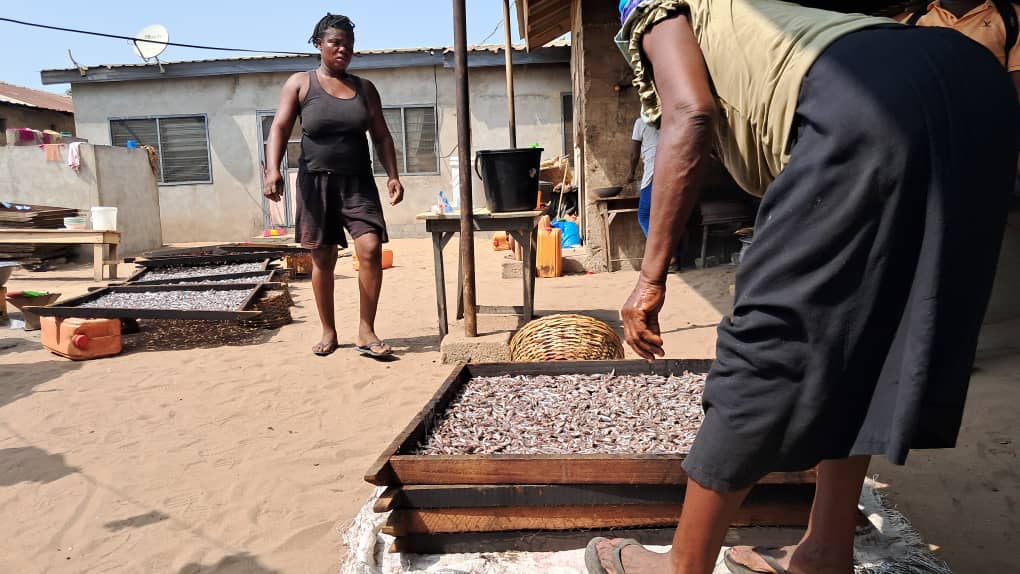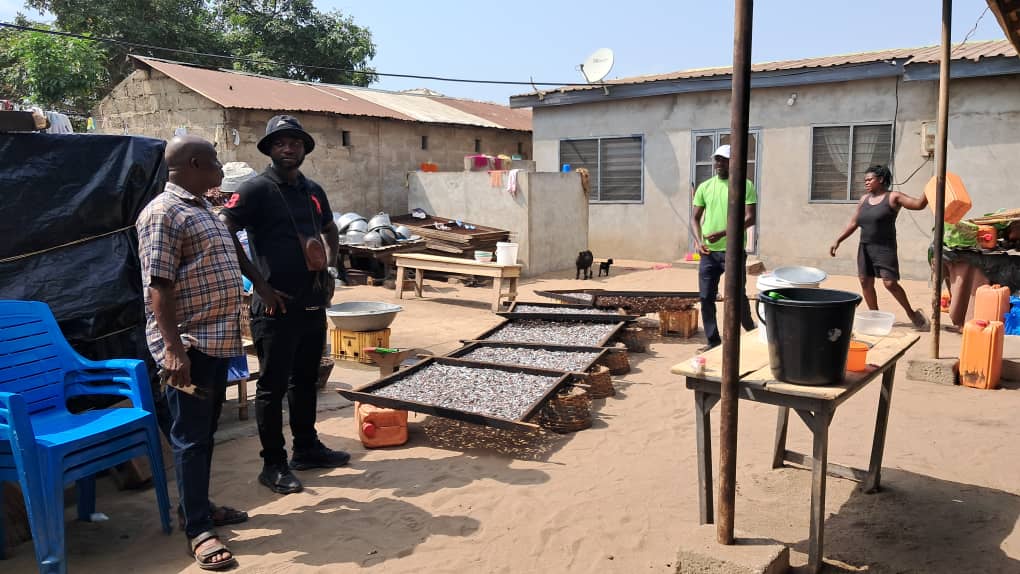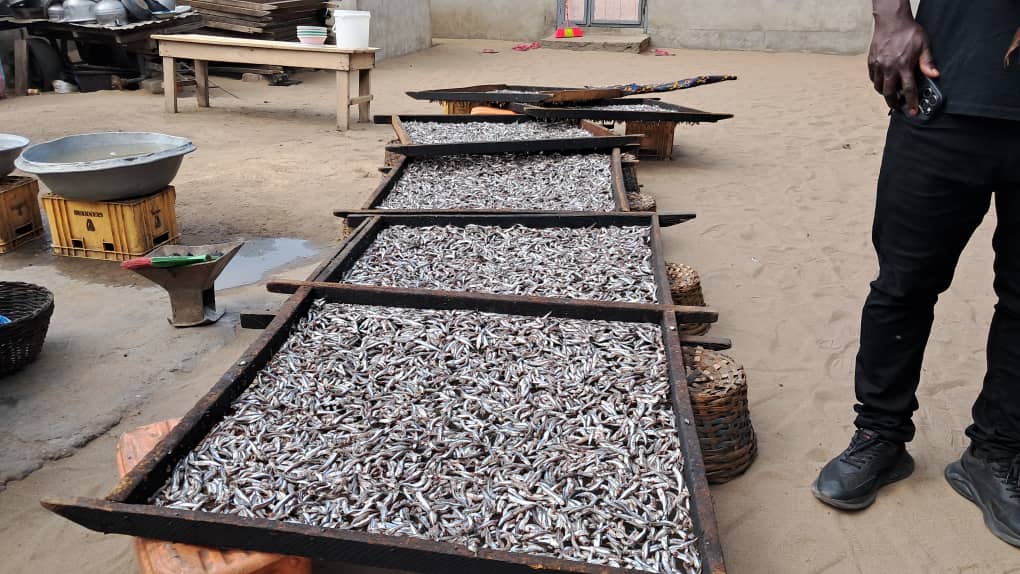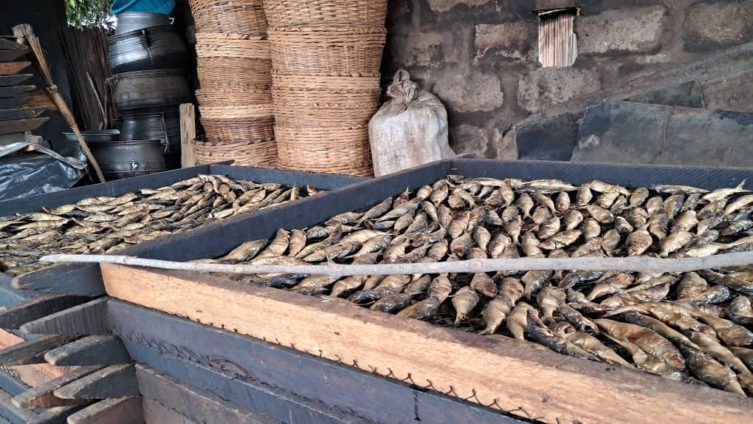Women involved in fish processing along Ghana’s coastal areas are calling on the government, particularly the Vice President-elect, Prof Jane Naana Opoku-Agyemang to address the devastating effects of illegal fishing trawlers operating in their waters.
These women, whose livelihoods depend on fish availability, lament the significant drop in fish catches caused by destructive practices such as boundary violations, light fishing, and the use of harmful chemicals.
They urge for stricter regulations on illegal trawling, improved enforcement of closed seasons, and the establishment of financial relief programs, including interest-free loans through proposed women’s banks, to alleviate their economic burdens.

The fishing industry remains a vital lifeline for many communities in Ghana, particularly for women engaged in fish processing. However, increasing incursions by illegal fishing trawlers are threatening their livelihoods, plunging families into financial distress.
Speaking to JoyNews at the Dzelukope, a group of women fish processors led by the Deputy Women Coordinator of Canoe and Fishing Gears Owners Association of Ghana (CAFGOHAG), Rita Esinu Kwadzi outlined their challenges, appealing for swift government action to restore their business sustainability and economic freedom.
Illegal fishing trawlers have been encroaching on Ghanaian waters, violating boundaries and operating during closed fishing seasons. These trawlers, equipped with advanced technologies, deplete fish stocks, leaving local fishermen with negligible catches.
Women fish processors, reliant on these fishermen for raw materials, face cascading challenges, including:
Economic Strain: The women explained that the high cost of fish caused by reduced supply makes it nearly impossible to earn a profit at the market.

"When we buy fish at high prices and take it to market, we cannot sell it, and our money is lost," one woman lamented.
Unregulated Practices: Techniques like light fishing and chemical fishing further harm marine ecosystems, exacerbating the problem.
Unemployment: With fish processing no longer viable, some youth have been forced to join the fishing trade despite the diminishing returns, deepening the cycle of poverty.
The women expressed hope that Prof Opoku-Agyeman, as a “mother figure,” would prioritise their plight. They proposed several solutions to mitigate the crisis:
Strict Regulation of Trawling: "If they can drive away these fishing trawlers, everything will work out well for us," a spokesperson emphasised. The women urged the government to reduce the number of trawlers and ensure compliance with fishing boundaries.
Strengthening Closed Seasons: They appealed for stricter enforcement of closed seasons to allow fish populations to recover, ensuring fairness by preventing trawlers from violating these periods.
Alternative Livelihoods: The women welcomed the idea of government-led initiatives, such as women-focused banks as promised by the Vice President-elect, offering interest-free loans, to empower them economically.

Support for Youth Employment: With many educated youth unable to find jobs, they advocated for government intervention to create opportunities outside the struggling fishing industry.
The women highlighted the far-reaching consequences of the crisis. "Our children graduate from university, only to return home jobless. Some are forced to join fishing, which is no longer profitable," they explained.
The economic strain has led to desperate measures among some fishermen, such as resorting to illegal and harmful practices, further aggravating the situation.
Despite their struggles, the women expressed optimism about the Vice President elect new office, viewing it as a beacon of hope.
"We believe she will intervene for us, so we can regain our freedom and enjoy our business once more," they said.
Their appeal underscores the urgent need for government action to address illegal fishing, support women in the sector, and foster a sustainable fishing industry.
The voices of these women fish processors echo a larger narrative of economic and social struggles in Ghana’s coastal communities. By addressing illegal fishing, introducing financial support mechanisms, and creating sustainable employment opportunities, the government can empower these women and restore their dignity.
As the Vice President is to resume office, the hope is that these pressing issues will receive the attention they deserve, ushering in relief and resilience for women and families along Ghana's coastline.
Latest Stories
-
ORAL: We won’t witch-hunt, we’ll focus on transparency, not revenge – Ablakwa
7 minutes -
Bawumia joins thousands in Kumasi for burial prayers for Ashanti Regional Imam
3 hours -
Blue Gold Bogoso Prestea Limited challenges government actions in court
3 hours -
Verdicts due for 51 men in Pelicot mass rape trial that shook France
3 hours -
Syria not a threat to world, rebel leader Ahmed al-Sharaa tells BBC
4 hours -
Patrick Atangana Fouda: ‘A hero of the fight against HIV leaves us’
4 hours -
Trinity Oil MD Gabriel Kumi elected Board Chairman of Chamber of Oil Marketing Companies
5 hours -
ORAL campaign key to NDC’s election victory – North America Dema Naa
5 hours -
US Supreme Court to hear TikTok challenge to potential ban
5 hours -
Amazon faces US strike threat ahead of Christmas
6 hours -
Jaguar Land Rover electric car whistleblower sacked
6 hours -
US makes third interest rate cut despite inflation risk
6 hours -
Fish processors call for intervention against illegal trawling activities
6 hours -
Ghana will take time to recover – Akorfa Edjeani
6 hours -
Boakye Agyarko urges reforms to revitalise NPP after election defeat
7 hours

